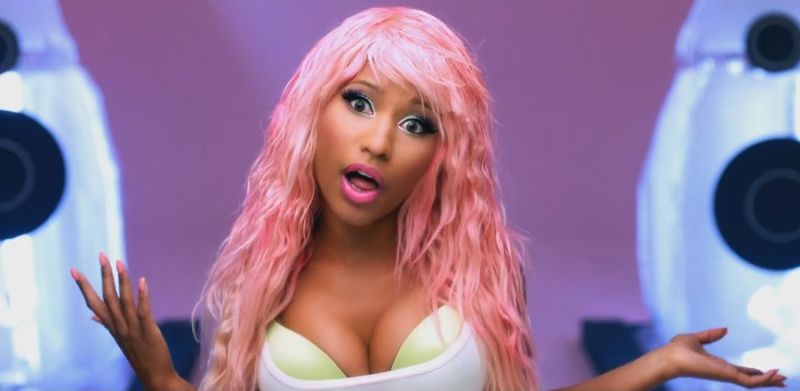"I'm not gonna tell you that story because I already wrote it in the book," she then says, exasperated, when prompted to repeat the details of a controversial section in which Hynde recalls being assaulted by a group of bikers sometime in her early '20s.
She never refers to it as rape, and has said some things I vehemently disagree with about women needing to "take responsibility" for how they dress and behave in such situations -- but, for our purposes here, that's beside the point. Greene is asking for the memoir's highlight reel, and in this case the highlights are some intensely personal revelations that Hynde doesn't really feel like reciting.
In the Minaj interview, writer Vanessa Grigoriadis notes a number of instances in which the pop star refuses to answer questions.
"I don’t even want to discuss that. That’s so old to me," says Minaj with an air of disgust when Grigoriadis asks how the singer was influenced by Lady Gaga's tendency toward costumes as performance art. She brushes off a question about her career's chronology in the early days, when she used to sell tapes out of her car, as "dumb." But the (diamond-covered) gloves really come off when the journalist asks if Minaj might possibly "thrive" on drama, like the beef between her boyfriend, Meek Mill, and her label mate, Drake.
Every one of the angry words Minaj lobs at Grigoriadis in response -- "rude," "troublemaker," "Do not speak to me like I’m stupid or beneath you in any way," and, lastly, "I don’t care to speak to you anymore" -- is arguably deserved, and the writer acknowledges as much, stating that she regretted the question as soon as it passed her lips. I actually really enjoyed this profile, and I think Grigoriadis tried to do right by Minaj. But the feeling the reader is left with, as Grigoriadis slinks away from the pop star's apartment, is one of Minaj being, yes, "difficult."
So: Let's talk about this notion of celebrities being "difficult." When a famous person gives an interview, it is usually because they have a new product -- a film, a book, an album -- to promote. And what we are measuring when we discuss how easy or tough of an interview they are, really, is their willingness to play ball: to answer the same questions over and over, to repeat sound bytes, to seem affable while they probably want to slit their throat. This is part of your job when you are a famous person and I don't exactly feel sympathy for most multi-millionaires when they have to sit through a few hackneyed conversations in order to make more millions.
And yet. How much of a person, exactly, are we owed in this format? Robert Downey Jr. famously stormed out of a press junket interview earlier this year when the reporter veered off-course, asking questions about his past substance abuse; the actor was mostly applauded for it. Lou Reed was aggressively obnoxious in interviews with such consistency that it became a part of his persona; besides, it felt earned.
But how, exactly, did he earn it? Where are the lines between "justifiably annoyed" and "difficult" and "such a badass, you can do whatever you want"? Do they move depending on what type of performer you are? Your genre? Your gender?
Beyoncé's chosen to dodge the question (and the print media) entirely as of late, and in return The New York Times ran a story whose entire thesis was that Beyoncé hasn't been giving interviews lately. Meanwhile, this week's issue of Rolling Stone promises the most "revealing" interview Keith Richards has granted in decades. That's presented as a gift -- there's no private-life debt, so to speak, that's owed.
Yes, there's an argument to be made that Hynde, in particular, was simply being asked to discuss material from the very thing she was on air to sell. But the response to both interviews, and the speed with which many are happy to simply cast both women as unnecessarily angry or contrary, raises questions for me about what we expect -- what we feel we deserve -- from our famous women, and why.
"The draw of an album made by a woman is not to consume what she’s created, but to traverse a pipeline directly to her being," wrote Sasha Geffen in an insightful essay for The New Inquiry, a piece I've revisited many times in the year since it was published. "She didn’t make the product; she is the product."
Geffen was writing primarily about music critics' tendency to treat female talent as effortless while men are granted agency, but I think the sentiment crosses art forms. We can all agree that Robert Downey Jr. shouldn't have to discuss personal problems in every interview for the rest of his life. Should Nicki Minaj? Does this contract change when your public persona is purposefully larger than life? How about when you routinely use mediums you control, like Twitter, to share opinions you do feel should be public -- like comments on racism in your industry?
I'll leave you with this: A study released last month by researchers at Arizona State University and the University of Illinois that most likely surprised some men and exactly zero women showed that women who express anger lose respect from their peers, while men actually gain it.
I'd be interested to hear what Hynde and Minaj would have to say about those findings. Journalists interviewing female celebrities, there's a free question for ya! Hope the answers aren't too difficult.


